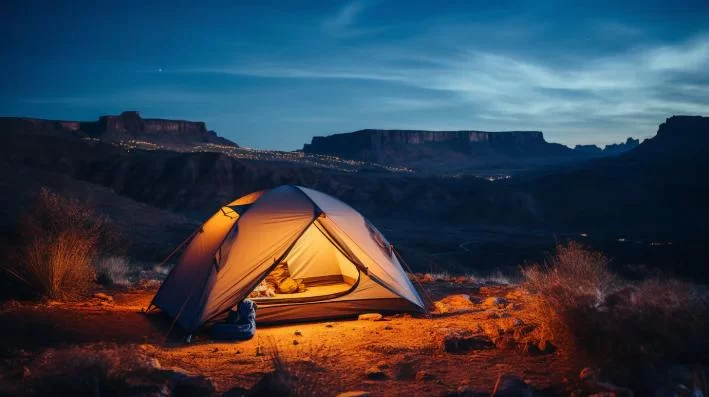Planning to camp in extreme conditions? Learn how to survive camping in harsh weather with these expert survival tips. Discover preparation, gear, and techniques to ensure a safe and enjoyable adventure in even the most extreme camping environments.

How to Survive Camping in Extreme Conditions: Expert Tips for a Safe Adventure
- Preparation for Extreme Camping Conditions
- Choosing the Right Gear for Harsh Weather
- Dealing with Extreme Weather While Camping
- Essential Survival Skills for Extreme Camping
- Real-Life Extreme Camping Experience
1. Preparation for Extreme Camping Conditions
When preparing for extreme camping conditions, your success largely depends on your level of preparation. Whether you’re heading into a remote desert or tackling the frigid cold of the mountains, the key to survival is understanding what to expect and how to plan accordingly.
- Know the Terrain: Research the area you're visiting. Understand its weather patterns, wildlife, and potential hazards. This helps you anticipate what you’ll need and how to stay safe.
- Pack for the Unexpected: Pack additional layers, extra food, water, and emergency supplies. Always have a first-aid kit and tools for basic repairs.
- Inform Someone: Always let someone know your plans and expected return. This could save your life if anything goes wrong.
A group of adventurers recently planned a camping trip in the Arctic Circle. By thoroughly researching the environment, packing emergency shelter and clothing for extreme cold, and notifying a local ranger station, they were able to endure severe snowstorms without incident.
2. Choosing the Right Gear for Harsh Weather
Your gear can make or break your survival in extreme camping conditions. It’s crucial to select high-quality, reliable equipment that can withstand harsh environments.
- Sleeping Bag and Tent: Choose a four-season tent designed for wind and snow resistance. A sleeping bag rated for colder temperatures will keep you warm in freezing conditions.
- Clothing: Invest in moisture-wicking base layers, a durable outer shell, and thermal socks and gloves. Avoid cotton, as it traps moisture and can lead to hypothermia.
- Cooking and Water Filtration: In remote areas, bringing a portable stove and water filtration system is essential. You may not have easy access to clean water or food.
On a recent hiking trip through the Colorado Rockies, a camper's ability to use a high-quality sleeping bag and portable stove made all the difference when temperatures dropped below freezing at night.
3. Dealing with Extreme Weather While Camping
When camping in extreme conditions, the weather can turn on you quickly. Knowing how to adapt to changing weather conditions is essential to your survival and well-being.
- Storms and Winds: Secure your tent and shelter in advance, and avoid setting up camp in low-lying areas that can flood. If a storm approaches, seek shelter immediately.
- Extreme Cold: Layering is key. Be sure to use windproof and waterproof outer layers, and keep your extremities (fingers, toes, ears) protected.
- Heatwaves and Sun Exposure: In hot conditions, ensure you're drinking plenty of water and take breaks in the shade. Wear a wide-brimmed hat and lightweight, light-colored clothing.
During a summer heatwave in Death Valley, a seasoned camper was able to stay hydrated and keep his body temperature regulated by following these tips. By staying in the shade during peak sunlight and applying sunscreen regularly, he avoided the potentially fatal risk of heatstroke.
4. Essential Survival Skills for Extreme Camping
When venturing into extreme conditions, survival skills are invaluable. Knowing how to handle emergencies can mean the difference between life and death. Here are some key skills to master:
- Building a Fire: Knowing how to start a fire in any weather is critical. Fires provide warmth, light, and the ability to cook food or purify water.
- Navigation: In remote locations, relying on a GPS device may not always work. Learning how to read a map and use a compass can help you stay oriented.
- First Aid: In case of injury, knowing basic first aid can save your life. Learn how to treat hypothermia, dehydration, and common camping injuries.
On a backpacking trip through Alaska’s wilderness, a hiker was able to use his fire-starting skills to survive a three-day storm. His knowledge of first aid also helped him tend to a friend who had sprained his ankle, allowing them both to continue their journey until rescue came.
5. Real-Life Extreme Camping Experience
To truly understand the challenges of extreme camping, nothing beats the experiences of those who have lived through them. Here’s a story from a group of campers who braved the Mojave Desert:
Last summer, a group of friends set out to camp in the Mojave Desert, hoping to catch a glimpse of the stunning night skies. However, they quickly encountered a series of challenges: extreme heat during the day, freezing cold at night, and unexpected storms. Despite the odds, their careful planning, reliable gear, and survival skills kept them safe. By knowing how to adapt to the extreme temperatures and using their gear wisely, they managed to enjoy the beauty of the desert without compromising their safety.
If you're considering a camping trip in extreme conditions, don’t go it alone—be prepared, and consider a stay at Pine Cliff Resort for an off-the-grid adventure with reliable amenities and expert guides. For more details or to book your next adventure, visit Pine Cliff Resort and start your journey into the wild!
Turkey Foot Campground
Forest Service Road 345, McKee, KY 40447, USA
Visit Location PageGilmore Campground
Gilmore Campground, Idaho 83801, USA
Visit Location Page